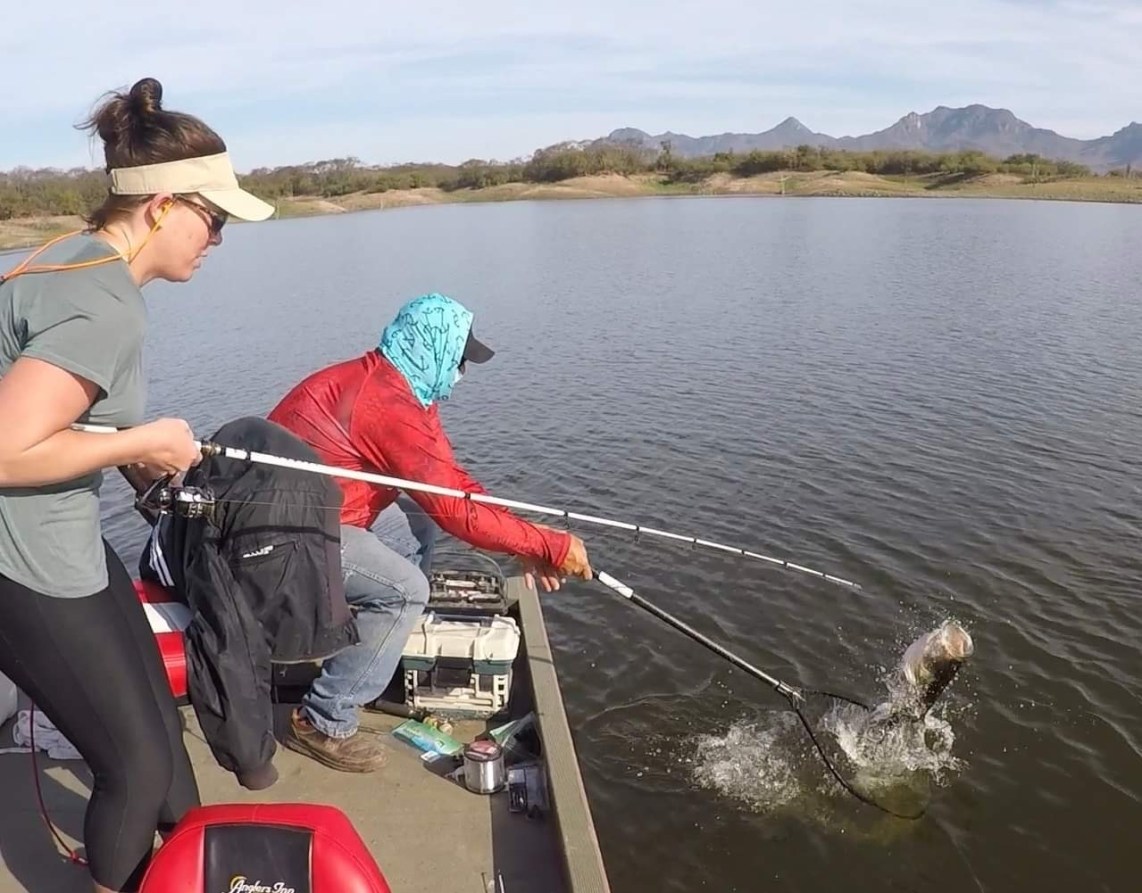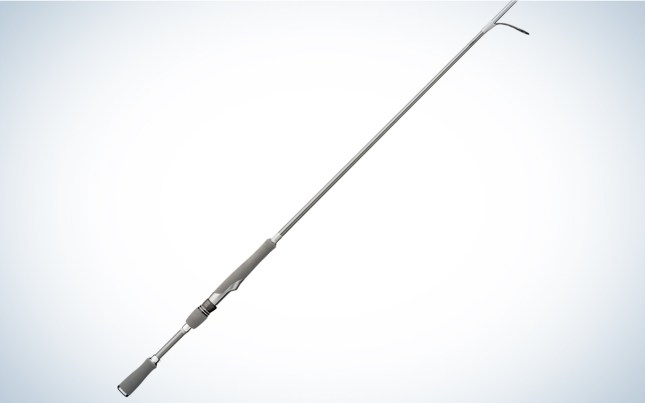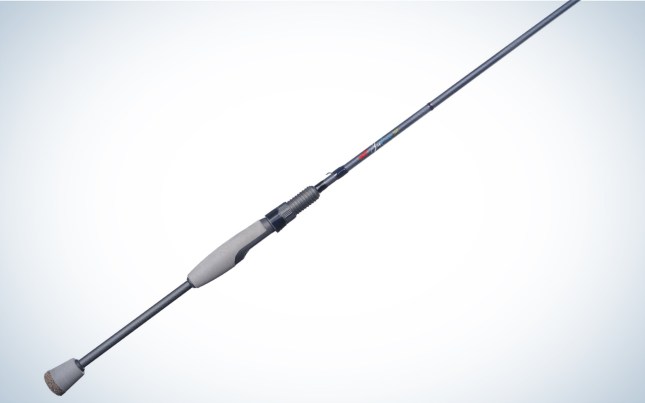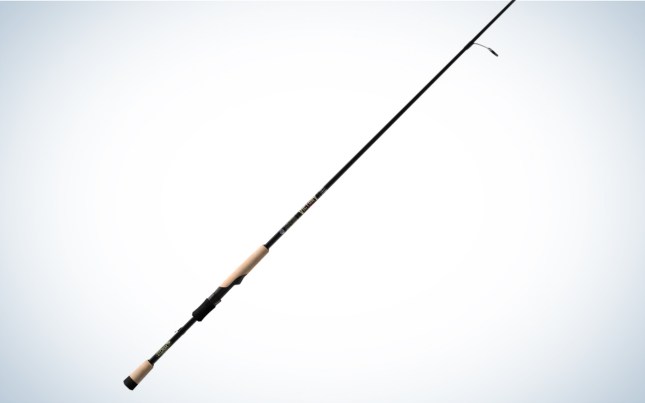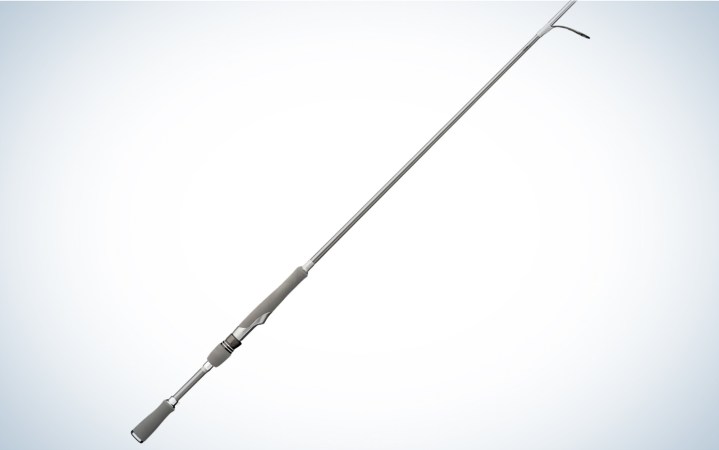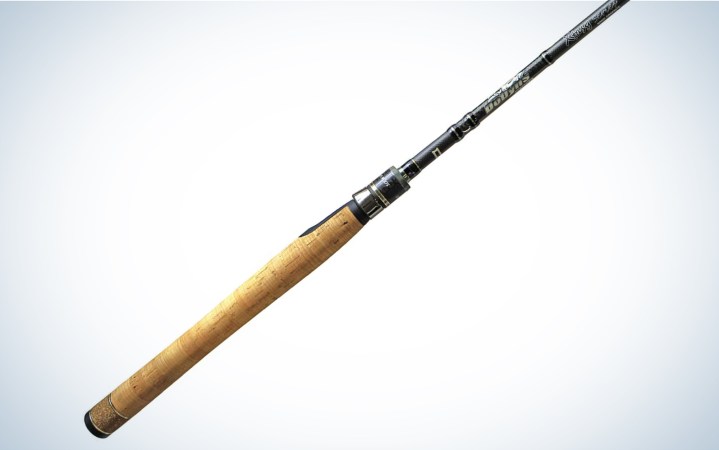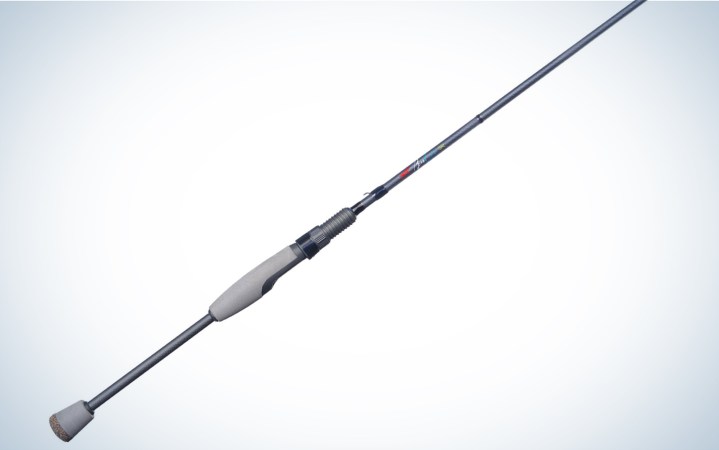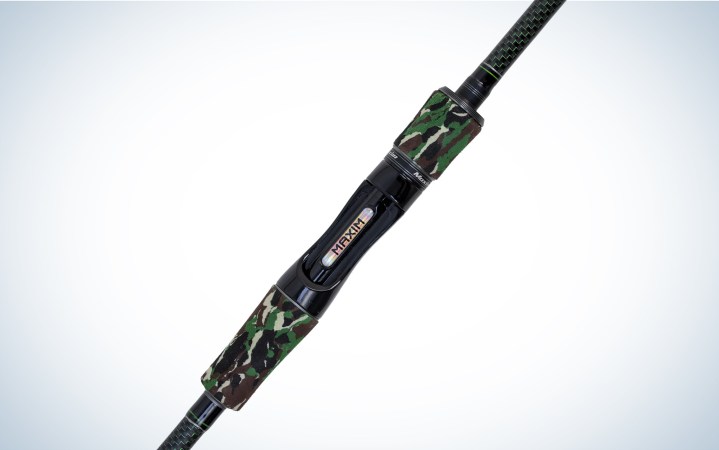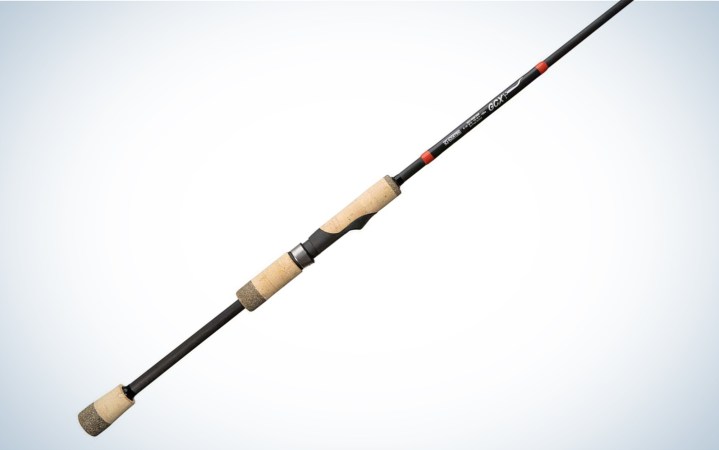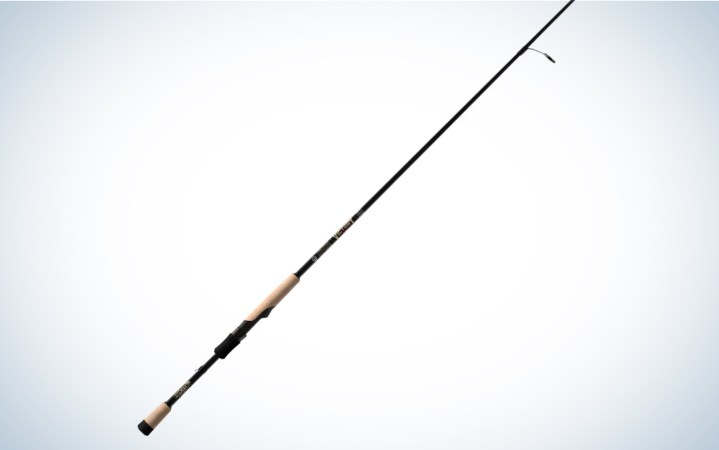We may earn revenue from the products available on this page and participate in affiliate programs. Learn More ›
Drop shotting has gone from a fringe technique, looked down upon by some hardcore bass anglers, to a staple for catching largemouth, smallmouth, and spotted bass. While it’s known as a limit-getting presentation, it’s remarkably effective on giant bass, too.
The right drop shot rod is a critical element for success whether bass are 2 feet or more than 50 feet deep. While many anglers try to get by with a do-everything 7-foot medium or medium-light spinning rod for drop shotting, the intricacies and nuances of the technique may demand different sticks for different circumstances—and of course, budget is a factor, too.
Whether you’re just getting started drop shotting, or you’re a master of vertical finesse techniques, I’ve made picking your next rod easier by finding the best drop shot rods for a variety of budgets and fishing styles.
- Best Overall: Daiwa Tatula Elite AGS Spinning Rod – Brent Ehrler
- Best Premium: Dobyns Xtasy 723 SF
- Best Budget: Falcon BuCoo SR Shoal Spin
- Best Heavy: Phenix Maxim 7 feet 7 inches Medium
- Best Light: G.Loomis GCX Drop Shot 820S DSR
- Most Versatile: St. Croix Victory 7 foot 1 inch Medium
How I Chose the Best Drop Shot Rods
I’ll admit it—while I’m not afraid of spinning tackle and embraced the drop shot relatively early in time, I still don’t use it as much as I should. That has started to change as I’ve accumulated and tested rods dedicated to the technique—and now I’ve caught largemouths to 7 pounds and smallmouths to 5 on this comparatively new technique. I know that it works in a ridiculously wide range of circumstances and also that the right rod makes a huge difference not only in the number that you hook, but more importantly, in the number that you land. With that in mind, I’ve forced myself to fish them as much as possible to take the guesswork away going forward.
Best Drop Shot Rods: Reviews and Recommendations
Best Overall: Daiwa Tatula Elite AGS Spinning Rod – Brent Ehrler
Best Overall
Daiwa Tatula Elite AGS Spinning Rod
Key Features
- Length: 7 feet 1 inch
- Lure Rating: 1/8 to 1/2 ounce
- Line Rating: 6 to 12 pound mono and 6 to 20 pound braid
- Split EVA grip
- Price: $290
Pros
- Length should be comfortable for anglers of all sizes
- Lightweight but super-strong
- Lightweight guides and components for all-day use
Cons
- Some might not like the bold color

California bass pro Brent Ehrler is an exceptional tactician across the board, but he made his reputation—and earned some of his biggest wins, including an FLW championship—with finesse techniques. He’s not afraid to use light line in traditional power fishing scenarios, and whether it’s a shaky head or one of the best drop shot baits, he’s uber-confident.
That shows in the Tatula Elite AGS, which is remarkably lightweight, yet musters incredible strength to move big bass from the depths. At the same time, it’s also forgiving enough that you won’t pull the hook on a smallmouth that surges or jumps boatside. I found the X45 carbon fiber blank to be exceptionally sensitive, even in depths of 30 feet or more whether I was using straight fluorocarbon or braid with a fluoro leader. The AGS (Air Guide System) guides are really light too.
This rod is exceptional in all aspects, and while it’s not inexpensive, if you’re only going to get one drop shot rod it would be a more-than-solid choice.
Best Premium: Dobyns Xtasy 723 SF
Best Premium
Dobyns Xtasy 723 SF
Key Features
- Length: 7 feet 2 inches
- Lure Rating: 3/16 to 5/8 ounce
- Full AAAA-grade cork grips
- Line Rating: 8 to 17 pounds
- Medium-fast action
- Price: $550
Pros
- Extremely lightweight
- Kevlar wrapping for extra strength
- Fuji components
Cons
- High price may be a barrier to many anglers
Western legend Gary Dobyns might reside and build his rods in Texas, but he’s never forgotten his California roots. Finesse techniques allowed him to win many of the nearly four dozen boats he claimed in tournament competition, and he was on the scene when drop shotting first started to gain traction on American shores. He knows what it takes to tempt pressured bass of all three species, and this rod is an homage to his excellence.
It’s an insane balance of lightweight and strength, with a Toray Nano blank, Fuji Titanium Torzite guides, and painted Fuji graphite reel seats. If you’re going to spend the bucks on this sports car, be sure to get an equally lightweight reel, lest you undermine the incredible balance of the rod. I’ve happily fished with some of the Dobyns rods from his less expensive lineups, and I’ve been thrilled with their performance, but this is for the angler who won’t settle for anything less than top of the line.
Best Budget: Falcon BuCoo SR Shoal Spin
Best Budget
Falcon BuCoo SR Shoal Spin
Key Features
- Length: 7 feet
- Lure Rating: ¼ to 1/2 ounce
- Line Rating: 8 to 15 pounds
- Action: Medium-light
- Flex: Fast
- Split Grip EVA Handle
- Price: $100
Pros
- Lightweight
- Exposed blank reel seat for direct contact with the blank
- Fuji guides
Cons
- Not ideal for heavier (over 1/2 ounce) drop shot weights
I’ve tested several of the Falcon BuCoo rods over the past couple of years, notably during the Outdoor Life best spinning rod test. I’ve also bought a few more for my own use, and yet I’m nevertheless surprised every time I find myself grabbing for one on a day of “fun fishing” over a rod that costs two or three times as much.
Despite the low price point, Falcon makes tools that you want to fish that simply feel comfortable in hand and load up right for both the cast and the hook set. This one is no different. The EVA grip is comfortable in hand and the Fuji components—often found only in more expensive rods—are foolproof and failsafe. I’d have no trouble relying on this “bargain” rod with money or the fish of a lifetime on the line. In fact, I think you could be happy with an entire arsenal of BuCoo rods.
Best for Heavy Weights: Phenix Maxim 7 feet 7 inches Medium
Best for Heavy Weights
Phenix Maxim 7 feet 7 inches Medium
Key Features
- Length: 7 feet 7 inches
- Lure Rating: 1/8 to ¾ ounce
- Line Rating: 8 to 14 pounds
- Flex: Fast
- Split grip EVA handle
- Price: $129
Pros
- “Extra” length moves a lot of line on the hook set
- Handles weights in the ¾ ounce class with ease
- Several custom components made expressly for Phenix
Cons
- Some anglers may find 7 foot 7 inch length unwieldy or unable to fit in certain rod storage
Phenix Rods has a long history of making specialty rods on the west coast, starting with “doodling” rods in the 1970s. Since then, they’ve become a respected national (and international) company, making tools for various species and every bass technique conceivable, but their spinning rods still fit the company’s heritage.
Most of the rods designed for drop shotting are medium-light or medium action. While this one is designated a “medium,” it’s just a little bit heavier than the others in that class. That means if you’re fishing in deep water, heavy current, or other conditions that make the use of a ½ ounce or greater weight necessary, you won’t be overpowered or lose control. The 7 foot 7 inch length allows for long casts if needed, but more importantly, it picks up a lot of line when you need to move a big fish that has grabbed your bait. It features a custom one-piece reel seat and proprietary SiC guides. The camouflage split-grip EVA handle makes them stand out as well.
Best Light: G. Loomis GCX Drop Shot 820S DSR
Best Light
G. Loomis GCX Drop Shot 820S DSR
Key Features
- Length: 6 feet 10 inches
- Lure Rating: 1/8 to 3/8 ounce
- Line Rating: 4 to 8 pounds
- Action: Extra Fast
- Flex: Mag-light
- Split grip cork handles
- Price: $250
Pros
- Tangle-free SeaGuide Hero One Guide Train
- Premium cork handles
- Made in the USA
Cons
- May be too light for fishing heavier drop shot weights deep and/or in current
This is a fun rod to fish when the bass are being difficult. I liked it with a Ned Rig and shaky head, but it really excelled with a lightweight drop shot. I found that I could use weights as light as 1/16 ounce around riprap, which meant the soft plastic got down, but nothing got snagged or buried in the rocks. Yet I still had enough muscle to get the fish out to safety.
The comfortable Fuji reel seats and premium cork handle provide sensitivity for all-day fishing, and the carbon blank is just stiff enough to drive the hook home with certainty, while the soft tip prevents you from overworking your lures. A lot of rods on the light side feel like toys or whippy noodles, but the GCX Drop Shot 820S DSR is a purpose-driven tool meant for serious anglers—and if you’re not already a serious angler, this will help you to perform like one.
Most Versatile: St. Croix Victory 7 foot 1 inch Medium
Most Versatile
St. Croix Victory 7 foot 1 inch Medium
Key Features
- Length: 7 feet 1 inch
- Lure Rating: 3/8 to ¾ ounce
- Line Rating: 6 to 20 pounds
- Action: Fast
- Flex: Medium
- Split grip cork and EVA handle
Pros
- High-modulus blanks are light and extremely sensitive
- Fuji VSS reel seat transmits the lightest bites
- 15-year transferrable warranty
- Made in the USA
Cons
- Some anglers may prefer a longer rod
If you have to pick one do-it-all rod for light to medium range finesse techniques, this would be a solid choice. It sits at the lower end of premium rods in terms of cost, and it can handle shaky heads, Ned Rigs, Neko Rigs, wacky worms, and drop shotting.
It may not be St. Croix‘s most expensive series, but they don’t skimp anywhere, from the Fuji Concept O guides to the VSS reel seat and even a premium locking nut. They use high-grade cork, too, but there’s a small section of foam right behind the reel seat. The U.S.-made rods are built with care, including an extra layer of Flex-Coat on the guides to make sure that they stay solidly in place. If you’re going in someone else’s boat and only have room for one spinning rod, you can’t go wrong with this one.
Things to Consider Before Buying a Drop Shot Rod
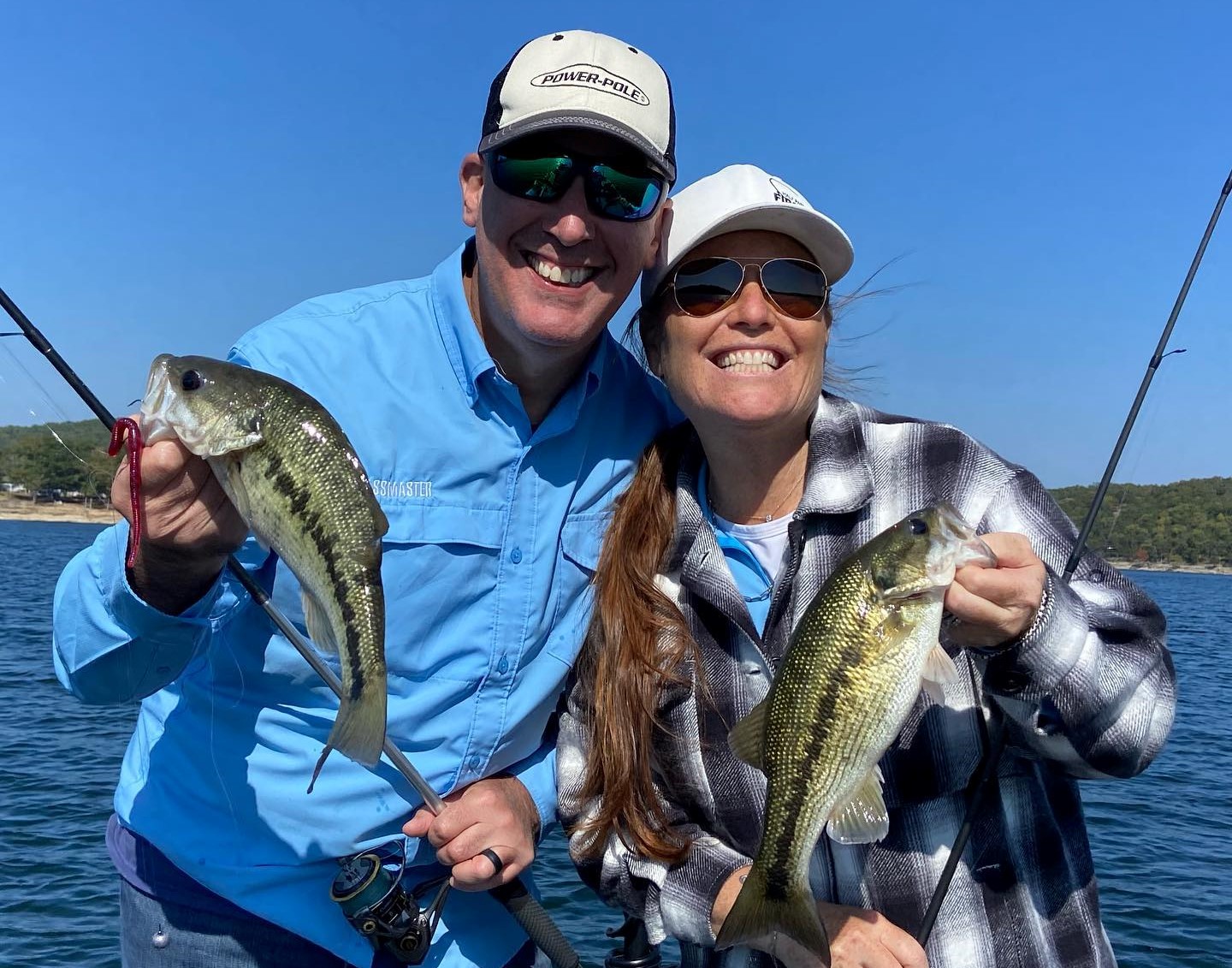
Length
Seven feet is a nice all-around mark for this technique, allowing you to move line on the hook set but still store it easily. At the same time, you might want to go longer in big water or with big fish, while smaller anglers might prefer something closer to 6 feet 6 inches. Yet, more length can be a disadvantage in close quarters, or when pitching the drop shot.
Power
For the most part, drop shotting is a light line technique, where finesse and stealth provide an advantage, but you still need power. That’s not just for big fish—you’d be surprised at how much chaos a rampaging 2-pound smallmouth can cause. Most of the time, you’ll likely be using 1/8 to 3/8 ounce weights, but when you stray to the edges (or outside) of those margins, it may demand a lighter or heavier rod.
Handle
Some anglers prefer cork, and others prefer EVA foam. Some like split grips, while others like full grips. Choose one you’ll want to keep in your hand all day, preferably with blank-through technology and an exposed reel seat that will enable you to feel the lightest-biting bass.
Budget
You can use a true bargain basement stick and experience success, and it’s also possible to head to the uppermost regions of the rod economy for custom features. It’s eminently possible to get a tournament-ready high-quality rod in the $100 to $250 range. Depending on what you can afford, and how many you’ll need to fill out your arsenal, there’s a reasonable possibility for everyone.
FAQs
The best all-around length for a drop shot rod is 7 feet.
The most common weights for drop shotting weigh 1/8 to 3/8 ounce.
A good drop shot rod can be had for $100 to $250, and the ultra-premium rods cost over $500.
A reel spooled with the best fluorocarbon or a braid with fluorocarbon leader is ideal for drop shot fishing.
Final Thoughts
Lots of “bubba” anglers initially resisted the drop shot, preferring to dunk heavy jigs or big worms in those same places. Today, however, all but the most stubborn among them have embraced it, and the few who have not are likely paying the price. A baitcasting rod and reel combo is still more natural and more efficient when it can be used, but they don’t excel for light-line techniques. If you skimp on a drop shot rod, you may end up paying the price when you finally find that mega-school or hook into a fish of a lifetime.
